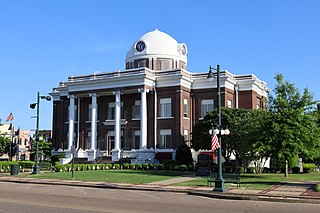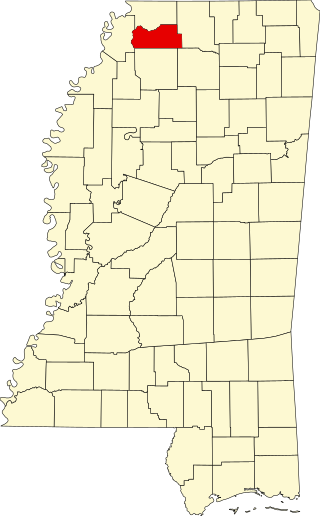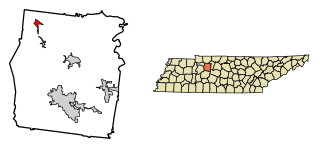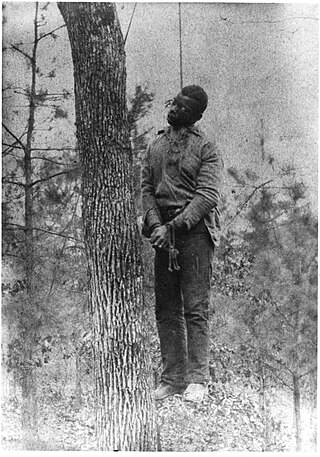
Memphis is a city in the U.S. state of Tennessee. It is the seat of Shelby County, in the southwesternmost part of the state, and is situated along the Mississippi River. With a population of 633,104 at the 2020 U.S. census, Memphis is the second-most populous city in Tennessee after Nashville.

Etowah County is a county located in the northeastern part of the U.S. state of Alabama. As of the 2020 census the population was 103,436. Its county seat is Gadsden. Its name is from a Cherokee word meaning "edible tree". In total area, it is the smallest county in Alabama, but one of the most densely populated. Etowah County comprises the Gadsden Metropolitan Statistical Area.

Shelby County is the westernmost county in the U.S. state of Tennessee. As of the 2020 census, the population was 929,744. It is the largest of the state's 95 counties, both in terms of population and geographic area. Its county seat is Memphis, a port on the Mississippi River and the second most populous city in Tennessee. The county was named for Governor Isaac Shelby (1750–1826) of Kentucky. It is one of only two remaining counties in Tennessee with a majority African American population, along with Haywood County.

Dyer County is a county located in the westernmost part of the U.S. state of Tennessee. As of the 2020 census, the population was 36,801. The county seat is Dyersburg. Dyer County comprises the Dyersburg, TN Micropolitan Statistical Area.

Tate County is a county located in the northwestern portion of the U.S. state of Mississippi. As of the 2020 census, the population was 28,064. Its county seat is Senatobia. Organized in 1873 during the Reconstruction era, from portions of DeSoto, Marshall, and Tunica counties, the county is named for Thomas Simpson Tate, one of the first prominent American settlers of the area.

Marshall County is a county located on the north central border of the U.S. state of Mississippi. As of the 2020 census, the population was 33,752. Its county seat is Holly Springs. The county is named for Chief Justice of the United States John Marshall, who presided in the early nineteenth century.

Leflore County is a county located in the U.S. state of Mississippi. As of the 2020 census, the population was 28,339. The county seat is Greenwood. The county is named for Choctaw leader Greenwood LeFlore, who signed a treaty to cede his people's land to the United States in exchange for land in Indian Territory. LeFlore stayed in Mississippi, settling on land reserved for him in Tallahatchie County.

DeSoto County is a county located on the northwestern border of the U.S. state of Mississippi. As of the 2020 census, the population was 185,314, making it the third-most populous county in Mississippi. Its county seat is Hernando.

Houston is a city and one of two county seats of Chickasaw County, in northeastern Mississippi, United States. The population was 3,623 at the 2010 census.

Shubuta is a town in Clarke County, Mississippi, United States, which is located on the eastern border of the state. The population was 441 as of the 2010 census, down from 651 at the 2000 census. Developed around an early 19th-century trading post on the Chickasawhay River, it was built near a Choctaw town. Shubuta is a Choctaw word meaning "smokey water".

Slayden is a town in Dickson County, Tennessee, United States. The population was 178 at the 2010 census.

Lynching was the widespread occurrence of extrajudicial killings which began in the United States' pre–Civil War South in the 1830s and ended during the civil rights movement in the 1950s and 1960s. Although the victims of lynchings were members of various ethnicities, after roughly 4 million enslaved African Americans were emancipated, they became the primary targets of white Southerners. Lynchings in the U.S. reached their height from the 1890s to the 1920s, and they primarily victimised ethnic minorities. Most of the lynchings occurred in the American South, as the majority of African Americans lived there, but racially motivated lynchings also occurred in the Midwest and border states. In 1891, the largest single mass lynching in American history was perpetrated in New Orleans against Italian immigrants.
Cedarbluff is an unincorporated community in Clay County, Mississippi, United States. It is located in south central Clay County along Mississippi Highway 50.
Lamar is a census-designated place and unincorporated community in Benton County, Mississippi, United States. It is located along Mississippi Highway 7 in western Benton County. Lamar has a post office with the ZIP code 38642. The nearly abandoned Mississippi Central Railroad runs through Lamar, and is only used rarely for freight trafficking. Lamar shares its ZIP code with the nearby community of Slayden.
Cayce, is an unincorporated community in Marshall County, Mississippi, United States.
Ell Persons was a black man who was lynched on 22 May 1917, after he was accused of having raped and decapitated a 15-year-old white girl, Antoinette Rappel, in Memphis, Tennessee, United States. He was arrested and was awaiting trial when he was captured by a lynch party, who burned him alive and scattered his remains around town, throwing his head at a group of African Americans. A large crowd attended his lynching, which had the atmosphere of a carnival. No one was charged as a result of the lynching, which was described as one of the most vicious in American history, but it did play a part in the foundation of the Memphis chapter of the NAACP.
Early Grove is an unincorporated community located in Marshall County, Mississippi, United States, near the Mississippi/Tennessee border. Early Grove is approximately 11 miles (18 km) west of Michigan City, approximately 10 miles (16 km) east of Mount Pleasant and approximately 20 miles (32 km) southeast of Collierville, north of U.S. Route 72.

On April 13, 1937, Roosevelt Townes and Robert McDaniels, two black men, were lynched in Duck Hill, Mississippi by a white mob after being labeled as the murderers of a white storekeeper. They had only been legally accused of the crime a few minutes before they were kidnapped from the courthouse, chained to trees, and tortured with a blow torch. Following the torture, McDaniels was shot to death and Townes was burned alive.
John Carter was an African-American man who was murdered in Little Rock, Arkansas, on May 4, 1927. Grabbed by a mob after another Black man had been apprehended for the alleged murder of a white girl, Carter was hanged from a telephone pole, shot, dragged through the streets, and then burned in the center of the city's Black part of town with materials that a white crowd of perhaps 5,000 people had looted from nearby stores and businesses.
The lynching of Henry Lowry, on January 26, 1921, was the murder of an African-American man, Henry Lowry, by a mob of white vigilantes in Arkansas. Lowry, a tenant farmer, had been on the run after a deadly shootout at the house of planter O. T. Craig on Christmas Day of 1920. Lowry went into hiding in El Paso, Texas; when he was discovered and extradited by train, a group of armed white men boarded the train in Sardis, Mississippi, and took Lowry to Nodena, near Wilson, Arkansas. He was doused in gasoline and burned alive before a mob of 500. A reporter from the Memphis Press witnessed the event, and word of the lynching soon spread around the country, aided by an article William Pickens wrote for The Nation, in which he described eastern Arkansas as "the American Congo".















